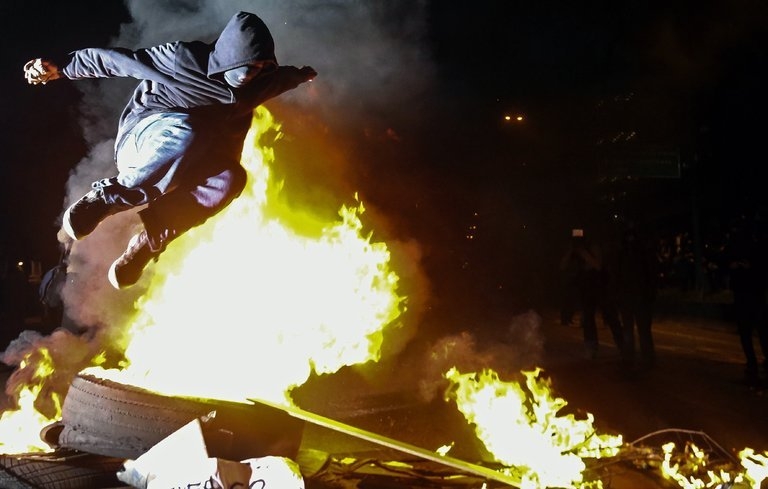
Protesting in São Paulo, Brazil, in June 2014 to mark the first anniversary of the June Journeys, when more than a million people took to the streets across the country against a hike in public transportation fares. Credit: Miguel Schincariol/Agence France-Presse — Getty Images
The New York Times
March 21, 2018
by Vanessa Barbara
Contributing Op-ed Writer
SÃO PAULO, Brazil — It goes like this: The government announces another increase in the bus fare, so a few Brazilians take to the streets, march for a couple of miles, and then the police decide they’ve had enough. A kind of pyrotechnic exhibition ensues, with gas and explosions. Everybody goes home, some after a short stay at the local police station, others with purple bruises for souvenirs.
A few days later, there’s another demonstration. And then another. Rinse and repeat until everybody gets tired, demonized, traumatized or sufficiently intimidated. The bus fare remains outrageous, and it will rise again next year.
The plot has been the same for many other grievances in the recent years: labor reforms; the reorganization of public schools; an illegitimate, unpopular presidency; a costly, foolish World Cup; a catastrophic Summer Olympics. In the end, all of these things went forward, as if no one had lost their teeth protesting against them.
This routine started in June 2013, in what is now known as June Journeys. The events were sparked by demonstrations against raising public transportation fares. When the police cracked down violently, the protests grew. More than a million people across the country took to the streets.
These demonstrations gave birth to a small generation of anti-authoritarian, left-wing and nonpartisan militants, who kept protesting for subsequent years over all kinds of issues. They have been dismissed as thugs, vandals, political pawns or simply ineffectual. (That last accusation may not be completely inaccurate.) But now, they are also being held accountable for the right wing’s advance in Brazilian politics and for the impeachment of the former President Dilma Rousseff.
“We were hasty in thinking that 2013 was democratic,” Luiz Inácio Lula da Silva, the popular former president and an icon of the Brazilian left, said last year. “I sincerely believe that Ms. Rousseff’s impeachment would not have occurred were it not for the June Journeys,” wrote Fernando Haddad, the former mayor of São Paulo and a prominent figure in Mr. da Silva’s Workers’ Party. “In my opinion, it was when the coup started,” Mr. da Silva tweeted in January.
Why do these left-wing politicians see the decidedly left-wing protesters as agents of the right? Well, in part because it’s easy to feel anxious about an uncontrollable, leaderless, movement with pluralistic demands. But there’s another reason. After June 2013, some people protested against political corruption as a whole, including the Workers’ Party, which was in power at the time. This eventually resulted in five big right-wing street demonstrations demanding the ouster of Ms. Rousseff, the elected president who came from the Workers Party. The right-wing demonstrators got their wish in August 2016.
But there’s no straight line that runs from the 2013 protests to the 2016 impeachment. The street rallies weren’t the golden opportunity they were all waiting for to take down Ms. Rousseff, nor were they the main factor that finally enabled them to seize power. After all, many on the right worked with the Rousseff administration. (Remember that President Michel Temer was Ms. Rousseff’s vice president.) Nor did the right “hijack” an intrinsically anarchic movement, considering the fact that many other people have kept on holding their own progressive rallies, small but pretty inconvenient. (See, for example, the demonstrations against the 2014 World Cup. Back then, criticizing the event for any reason was considered an affront to the governing left.)
That view is simplistic and only serves to evade the burden of responsibility. In 13 years of Workers’ Party rule, the traditional left missed many crucial opportunities to effectively change Brazil. Now they need someone else to blame for their losses. And the current scapegoat seems to be the protesters of the far left — those who dared to criticize the Workers’ Party’s decisions in the past.
The truth is, the movement that began in 2013 has protested against bad policies from all governments, left or right, regardless of whether or not these protests could harm a particular political party. These protesters don’t necessarily align with other traditional social movements, like the landless or the homeless workers, labor unions or student organizations. They refuse hierarchical authority and they are impossible to control. And they bring up important issues, sometimes long before anyone else.
For example: The Free Fare Movement, the main group behind the 2013 protests, didn’t reduce transport fares, but it did force politicians and middle-class citizens to think seriously, for the first time, about the need to stop prioritizing cars and start investing in public transportation. Another example: Little by little, people are coming to understand that global sports events aren’t always a good idea after all, especially for the poor. The activists were the first ones to publicly discuss the issue in concrete terms of those who were being harmed — and the events proved them right. Despite the accusations of the Workers’ Party and its supporters, those were progressive claims.
Sometimes, nothing concrete is achieved right away, but new ideas are put into the realm of the plausible. Maybe later they’ll be promoted to the realm of necessary and, then, to the inevitable. For now, free public transport is still considered utopian, but universal health care and free public schools are not. Rallying could also be a form of raising a new collective conscience and fostering solidarity on a broader scale. From the perspective of a ruling party, nothing is more democratic than to accept this.
Protests could also have a kind of Kantian beauty, independent of their results. As Daniel Cohn-Bendit, a student leader of the 1968 protests in Paris, wrote: “We see something fleetingly, and it vanishes. But that is enough to prove that this thing can exist.” It is past time that Brazil’s main left-wing party stops blaming the streets and makes peace with 2013. Maybe then it can find different paths of action, a glimpse of possibility, new plausible utopias — and a viable alternative for the next presidential elections.
Vanessa Barbara, a contributing opinion writer, is the editor of the literary website A Hortaliça, and the author of two novels and two nonfiction books in Portuguese.
A version of this op-ed appears in print on March 21, 2018, on Page A15 of the National edition with the headline: Why bother protesting?.

